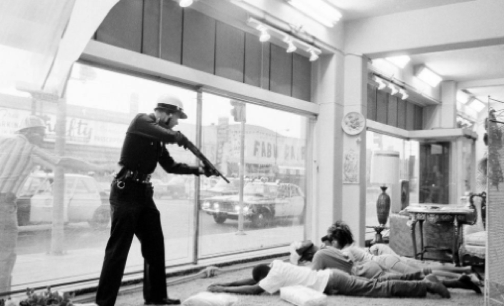The David and Barbara Pryor Center for Arkansas Oral and Visual History opens its fall 2020 lecture series next Thursday with "Feeling Riots: The Emotional Language of Urban Rebellion," presented by Lisa M. Corrigan, professor of communication in the Fulbright College of Arts and Sciences.
This will be the first of four lectures focusing on racism, social justice, and policing hosted by the Pryor Center. Corrigan's lecture will be held virtually via Zoom at 6 p.m. Thursday, Sept. 24. Please register in advance for this event.
Corrigan will reflect upon the multiple interpretations of major urban rebellions in the United States between 1964-1969 to understand how descriptions of the major race riots, especially the metaphor of the powder keg, created and reflected racialized political feelings where hopelessness replaced hope as the emotional framework for racial liberalism and as the possibly of integration ebbed.
Corrigan is director of the Gender Studies Program and is affiliated with the Latin American and Latino Studies Program. She is a feminist critical race scholar who researches and teaches in the areas of intimacy studies, social movement studies, the Black Power and civil rights movements, prison studies, feminist studies, and the history of the Cold War.
Corrigan's first book, Prison Power: How Prison Influenced the Movement for Black Liberation, is the recipient of the Diamond Anniversary Book Award and the 2017 African American Communication and Culture Division Outstanding Book Award, both from the National Communication Association.Her second book is titled Black Feelings: Race and Affect in the Long Sixties.
Corrigan cohosts a popular podcast with Laura Weiderhaft called Lean Back: Critical Feminist Conversations.
Upcoming Pryor Center Presents Lectures Include:
- Oct. 22 – Shaun L. Gabbidon – 'Shopping While Black: Hidden Injustices in the Private Justice System'
- Nov. 4 – Michael Sierra-Arévalo – 'Peril on Patrol: Death, Danger, and US Policing'
- Dec. 3 – Natalie Todak – 'Body-Worn Cameras and Police Accountability: High Hopes, Lackluster Evidence'
About the The David and Barbara Pryor Center for Arkansas Oral and Visual History: The David and Barbara Pryor Center for Arkansas Oral and Visual History is an oral history program with the mission to document the history of Arkansas through the collection of spoken memories and visual records, preserve the collection in perpetuity, and connect Arkansans and the world to the collection through the Internet, TV broadcasts, educational programs, and other means. The Pryor Center records audio and video interviews about Arkansas history and culture, collects other organizations' recordings, organizes these recordings into an archive, and provides public access to the archive, primarily through the website at http://pryorcenter.uark.edu. The Pryor Center is the state's only oral and visual history program with a statewide, seventy-five county mission to collect, preserve, and share audio and moving image recordings of Arkansas history.
About the Fulbright College of Arts and Sciences: The Fulbright College of Arts and Sciences is the largest and most academically diverse unit on campus with three schools, 16 departments and 43 academic programs and research centers. The college provides the majority of the core curriculum for all University of Arkansas students.
About the University of Arkansas: The University of Arkansas provides an internationally competitive education for undergraduate and graduate students in more than 200 academic programs. The university contributes new knowledge, economic development, basic and applied research, and creative activity while also providing service to academic and professional disciplines. The Carnegie Foundation classifies the University of Arkansas among only 3 percent of colleges and universities in America that have the highest level of research activity. U.S. News & World Report ranks the University of Arkansas among its top American public research universities. Founded in 1871, the University of Arkansas comprises 10 colleges and schools and maintains a low student-to-faculty ratio that promotes personal attention and close mentoring.
Topics
Contacts
William A. Schwab, executive director
Pryor Center
479-575-6829,
Andra Parrish Liwag, director of communications
Fulbright College of Arts and Sciences
479-575-4393,
